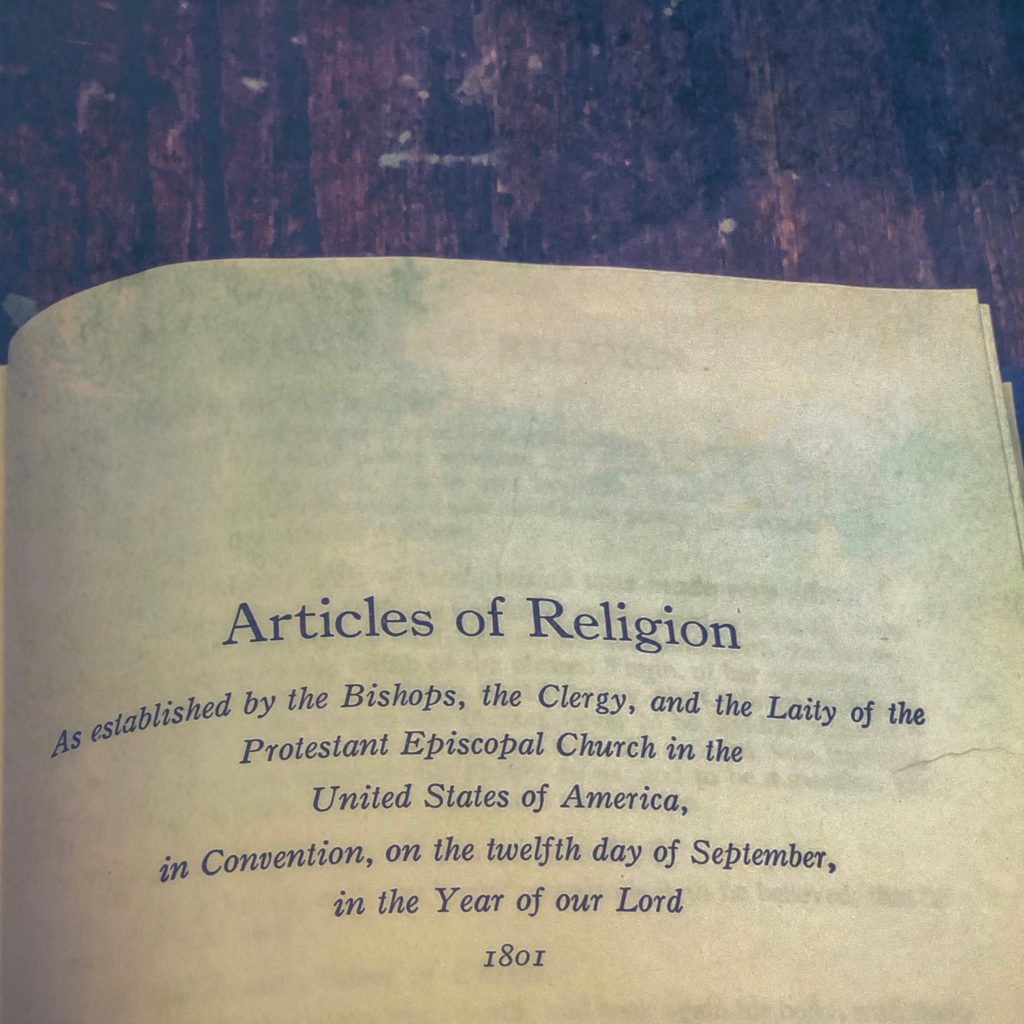
The Offering of Christ once made is that perfect redemption, propitiation, and satisfaction, for all the sins of the whole world, both original and actual; and there is none other satisfaction for sin, but that alone. Wherefore the sacrifices of Masses, in the which it was commonly said, that the Priest did offer Christ for the quick and the dead, to have remission of pain or guilt, were blasphemous fables, and dangerous deceits.
by David Mahfood
Introduction: Atonement and the Eucharist
Article XXXI has two components: a broad statement about the nature of Christ’s atoning work as a certain kind of offering, and a polemic against the Roman Catholic understanding of the Mass as a sacrifice—the latter of which is supposed to follow from the former. Because Article XXXI shows up in the context of other articles on the Eucharist rather than, say, nearer to those on the Person of Christ, or on the doctrine of justification, the emphasis seems to fall on the second component, what is said about the Eucharist: the opening statement about atonement is functioning as a warrant or justification for what follows, rather than itself being the central point.
Confessional statements are usually not written simply to summarize the core elements of the faith in a neutral and disinterested way; they are produced in the midst of ongoing conflicts. And here, we can see that conflicts about core theological claims gain urgency and significance in how they play out in worship. In talking about the early ecumenical councils and creeds, theologians often observe that the Church did not canonize a particular doctrine of atonement the way they canonized key Trinitarian and Christological claims. In Article 31, the Anglican Church makes a claim about the atonement, because it has to in order to answer a pressing practical question about the Eucharist—to wit, does the priest offer a sacrifice there which brings remission of sins, perhaps for the dead as well as the living? To see what the article is doing in answering the latter question, we can start by thinking through what it says about Christ’s work, and then see how that is applied to the question of the Eucharist.
I. Atonement: redemption, propitiation, and satisfaction
First, the article tells us that Christ has made something called an offering—and that he did it once. Something has been given, with sacrifice (in its theological connection to the Temple sacrificial system) pointing us to the fact that the recipient of this gift is God. The context of the Eucharist makes it clear that the offering in question is Christ’s life, given at the cross—the article is insisting that when Christ dies, he is making an offering to God. Moreover, this offering is a perfect one, and is in some way adequate to resolve the problems posed by sin (and all sin, at that).
To call Jesus’s death an offering raises many questions—in what way is Jesus’s execution a gift to God? Isn’t it an unjust killing by corrupt human powers? Why would that be a gift to God? In what way does it resolve the problems posed by sin? And what are the problems posed by sin, for that matter? While the article doesn’t give definite answers to questions like this, it does elaborate somewhat by the terms it applies: redemption, propitiation, and satisfaction. Each of these terms alludes to scripture and tradition, and each is suggestive of different ways of thinking about the problem of sin and the way that the cross is a solution to it.
“Redemption” refers to buying someone out of bondage; to say that Christ redeems us is to say he pays a price to free us. This language recalls God bringing Israel out of slavery in Egypt: the God of Israel is a God who redeems, who does what is necessary to liberate God’s people. There is a cost to setting us free, but in Christ, God fully bears this cost on our behalf. Who, if anyone, is receiving this payment? Patristic theologians like Origen and Gregory of Nyssa suggested that Christ in some sense offers his own life as payment to the devil in order to purchase those in bondage to the devil—not unlike Aslan offering himself to the White Witch in Edmund’s place in The Lion, the Witch, and the Wardrobe. One might wonder why God should need to pay the devil at all—does God negotiate with terrorists? Gregory of Nyssa suggests that God saves by an act of ransom payment (in part) to display the excess of divine justice, offering a price the devil would accept voluntarily rather than overruling the devil by force, even though God had every right to do so. Alternatively, images of Christ as offering himself as a literal ransom to the devil might be thought of as metaphorical, mythic depictions of the fundamental truth that there was in fact a cost involved in saving us, namely Christ’s own life, exacted by the powers from which Christ was working to free us, and that in Christ God paid this cost, fully and completely. This could be so even if no one named or accepted Christ’s life as a ransom payment.
“Propitiation” is the idea of placating or appeasing an offended party, assuaging anger. Likewise, “satisfaction” involves fulfilling a debt, especially a debt incurred by some wrongdoing. To offer satisfaction would be an act of propitiation. Propitiation goes back to the way some have thought Hebrew sacrifice to address sin, offering God something valuable (namely the life of an animal) in order to avert wrath brought on by sins. The term satisfaction likewise has ancient roots in Christian thought, especially associated with the practice of penance. It appears in the Rule of St. Benedict, for instance, where it describes a prescribed act of repentance monks would be required to make before being accepted back into their community’s liturgical life after committing a very serious sin. It came to be applied to the doctrine of atonement in a thoroughgoing way by St. Anselm of Canterbury, who envisioned Christ’s willingness to give his own life as an infinitely valuable gift outweighing the infinite debt of sin.
These terms tend to call up images of angry feudal lords, or harsh judges bent on exacting strict justice of every crime. The idea of propitiating God or offering satisfaction can seem quite at odds with the idea of a gracious and forgiving God. It can suggest an angry father who only sets aside his anger after he has poured it out on an innocent victim who voluntarily steps in out of compassion for us.
But given that Article I insists that the Trinity is one God, and this God is “without passions,” it cannot mean here in Article XXXI that God is literally overcome with rage that just has to be vented, or that the Father is angry and demands justice while the Son wants to protect us. Salvation must be altogether a unified act of the one God who is Father, Son, and Holy Spirit. And it can’t take the shape it does because of an opposition between love and justice, because this would be akin to saying God has potentially conflicting parts.
A better way to understand these concepts is to say that satisfaction is an expression of mercy as much as of justice. Why? We can think of it like this: God gave humanity a high calling and intended to reward us for fulfilling it. When we failed to live up to that calling and instead caused a great deal of harm to God’s creation, God did not destroy us for it—but nor does God set aside our high calling. Instead, God comes to fulfill that calling in every respect as a member of the human family, and offer complete satisfaction for the harm we caused. That is what it means to say Christ makes perfect satisfaction and propitiation for us. In his perfect faithfulness, preaching and embodying truth and justice even unto death, Christ offers what God initially asked of humanity, and more—indeed, more than enough to set things completely right. Christ then shares the reward he merited with all who join themselves to his self-offering by faith.
II. Atonement and Eucharistic Sacrifice
So much for what this article says about Christ’s work—how does this bear on the Eucharist? The second sentence of the article seems intended to address the Roman Catholic practice of viewing the Mass as itself a propitiatory sacrifice which can be offered to the benefit of individuals, that is, to obtain grace for them, remission of their sins, and so forth. The argument Article XXXI makes regarding this practice is simple enough: Christ’s work on the cross was perfect satisfaction for all sin, therefore no further satisfaction is needed, therefore the Mass cannot be further satisfaction. No need for Christ to be offered again to obtain remission of sins for anybody.
Now, although in the Thirty-Nine Articles, the concept of sacrifice is only affirmed of Christ’s atoning work, Article XXXI is compatible with calling many other aspects of the Christian life “sacrifice,” such as the “sacrifice of praise.” Indeed, Christians are called to offer themselves as a living sacrifice through the way we love and serve one another (Romans 12). Such sacrifice might well be offered during the Eucharistic service, and so for that reason it can be appropriate to talk about the Eucharist in sacrificial terms. What this article denies is that Christ’s body and blood are literally offered again in the Eucharist (or indeed that they are literally present at all—on which see Article XXVIII).
It should be said that the Catholic view is not that the Mass is another sacrifice; it is the same one offering of Christ, but now presented “in an unbloody manner” through the ministry of the priest. And so, perhaps this view does not contradict the truth that there is “none other” satisfaction for sin but that which Christ achieved on the cross. And yet, there is as crucial difference here about how that satisfaction is accessed and received. On the Catholic view, it is possible to receive grace through the Mass—albeit grace that was merited by Christ at the cross—because it is the one perfect offering presented again. On this view, it is possible to offer this sacrifice for another person not present (even souls in Purgatory), meriting the grace of repentance for them. The Articles teach, on the contrary, the grace merited by Christ’s satisfaction is accessed only by faith in the heart of the believer—not by re-presenting the self-offering of Christ, but simply by believing in the offering already made.
David Mahfood serves as Assistant Professor of Theology at Johnson University’s Florida campus. When he isn’t talking about St. Anselm, David enjoys fantasy novels, video games, and TV shows. He lives in Kissimmee with his wife Johannah, son Matthew, and daughter Katie.
